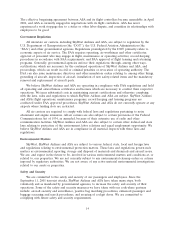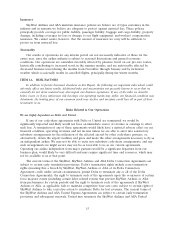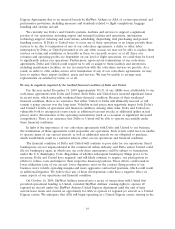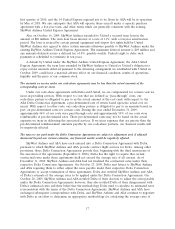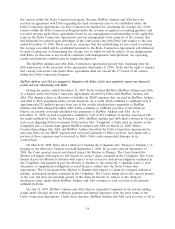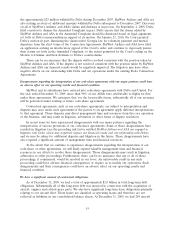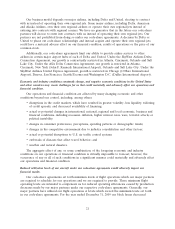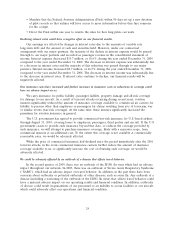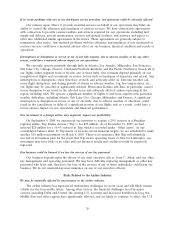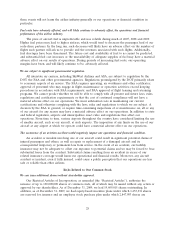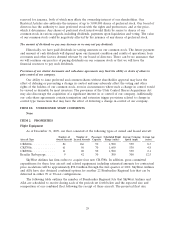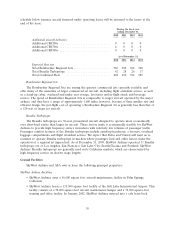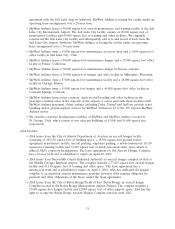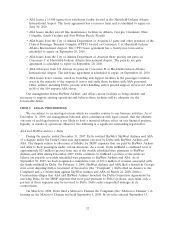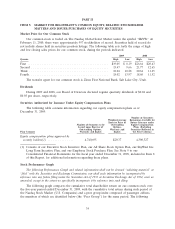SkyWest Airlines 2009 Annual Report Download - page 28
Download and view the complete annual report
Please find page 28 of the 2009 SkyWest Airlines annual report below. You can navigate through the pages in the report by either clicking on the pages listed below, or by using the keyword search tool below to find specific information within the annual report.• Mandate that the Federal Aviation Administration (FAA) within 90 days set up a new database
of pilot records so that airlines will have access to more information before they hire someone
for the cockpit.
• Direct the FAA within one year to rewrite the rules for how long pilots can work.
Declining interest rates could have a negative effect on our financial results.
Our earnings are affected by changes in interest rates due to the amounts of variable rate
long-term debt and the amount of cash and securities held. However, under our contractual
arrangement with our major partners, the majority of the decline in interest expense would be passed
through to our major partners and recorded as passenger revenue in the consolidated statement of
income. Interest expense decreased $19.7 million, or 18.6%, during the year ended December 31, 2009
compared to the year ended December 31, 2008. The decrease in interest expense was substantially due
to a decrease in interest rates and the majority of this reduction was passed through to our major
partners. Interest income decreased $9.7 million, or 46.5% during the year ended December 31, 2009,
compared to the year ended December 31, 2008. The decrease in interest income was substantially due
to the decrease in interest rates. If interest rates continue to decline, our financial results will be
negatively affected.
Our insurance costs have increased and further increases in insurance costs or reductions in coverage could
have an adverse impact on us.
We carry insurance for public liability, passenger liability, property damage and all-risk coverage
for damage to our aircraft. As a result of terrorist attacks occurring during recent years, aviation
insurers significantly reduced the amount of insurance coverage available to commercial air carriers for
liability to persons other than employees or passengers for claims resulting from acts of terrorism, war
or similar events (war-risk coverage). At the same time, these insurers significantly increased the
premiums for aviation insurance in general.
The U.S. government has agreed to provide commercial war-risk insurance for U.S.-based airlines
through August 31, 2010, covering losses to employees, passengers, third parties and aircraft. If the U.S.
government ceases to provide such insurance beyond that date, or reduces the coverage provided by
such insurance, we will attempt to purchase insurance coverage, likely with a narrower scope, from
commercial insurers at an additional cost. To the extent this coverage is not available at commercially
reasonable rates, we would be adversely affected.
While the price of commercial insurance had declined since the period immediately after the 2001
terrorist attacks, in the event commercial insurance carriers further reduce the amount of insurance
coverage available to us, or significantly increase the cost of obtaining such coverage, we would be
adversely affected.
We could be adversely affected by an outbreak of a disease that affects travel behavior.
In the second quarter of 2009, there was an outbreak of the H1N1 flu virus which had an adverse
impact throughout our network. In 2003, there was an outbreak of Severe Acute Respiratory Syndrome
(‘‘SARS’’), which had an adverse impact on travel behavior. In addition, in the past there have been
concerns about outbreaks or potential outbreaks of other diseases, such as avian flu. Any outbreak of a
disease (including a worsening of the outbreak of the H1N1 flu virus) that affects travel behavior could
have a material adverse impact on our operating results and financial condition. In addition, outbreaks
of disease could result in quarantines of our personnel or an inability to access facilities or our aircraft,
which could adversely affect our operations and financial condition.
24


